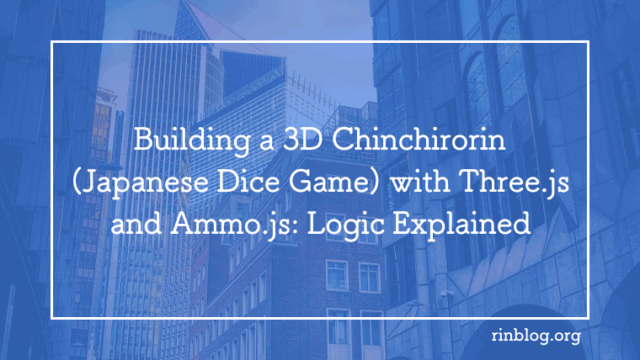I created a web application called “Pokémon Palette” that allows you to generate Pokémon-themed color icons
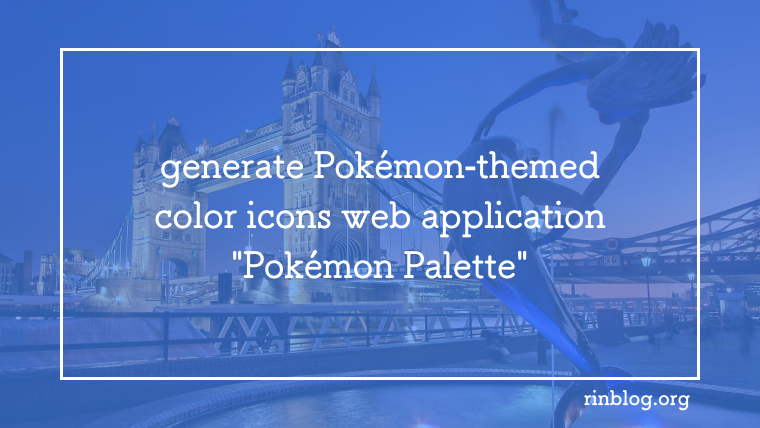
I recently launched a web app that fully reflects my personal hobby — Pokémon Palette.
I’ve loved Pokémon since childhood, whether watching the anime or playing the games. I also enjoy Pokémon illustrations, so I thought it would be fun to combine that love with my web coding skills to create something unique. The result is this web app.
How This Web App Works
The framework is primarily built with Vue.
Here’s the overall flow of how the app works:
- Prepare images to extract colors from
- Use JavaScript libraries to obtain colors from the images
- Render extracted colors into icon-style designs
- Allow color changes by clicking icons
- Enable icon downloads
Preparing Images for Color Extraction
First, let me introduce the package that manages the essential Pokémon data used for color extraction.
Among the many competing options in the Pokémon data space, the one I found most reliable is this:
GitHub – fanzeyi/Pokemon-DB: A Pokémon database in JSON format.
It provides JSON data for:
- Pokémon
- Items
- Moves
- Types
This package also included the Pokémon images I wanted to use for this app.
Here’s an example with Lucario:
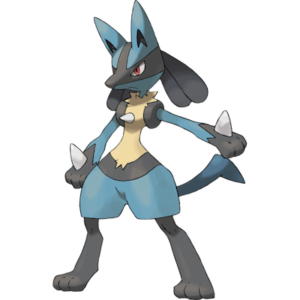
Extracting Colors from Images with JavaScript Libraries
Since I wanted to dynamically extract colors from images and render them as icons, I used a few JavaScript libraries specialized for this.
I tried more than four, but the results often overlapped. So, I narrowed it down to three:
Vibrant.js
サンプルコード
var img = document.createElement('img');
img.setAttribute('src', 'examples/octocat.png')
img.addEventListener('load', function() {
var vibrant = new Vibrant(img);
var swatches = vibrant.swatches()
for (var swatch in swatches)
if (swatches.hasOwnProperty(swatch) && swatches[swatch])
console.log(swatch, swatches[swatch].getHex())
/*
swatches内に配列で以下のような値が返ります。
Vibrantが特徴的な色でMutedが多く使わている色…でしょうか?
* Results into:
* Vibrant #7a4426
* Muted #7b9eae
* DarkVibrant #348945
* DarkMuted #141414
* LightVibrant #f3ccb4
*/
});
color-thief.js
サンプルコード
//colorはr,g,bそれぞれが配列として入ります。
var colorThief = new ColorThief();
var img = document.querySelector('#colorthief img');
var color = colorThief.getColor(img);
console.log(color);
rgbaster.js
サンプルコード
var img = document.getElementById('image');
/*
payload.dominant:メインカラー
payload.secondary:サブカラー
payload.palette:よく使われる色10色が入ります。
*/
RGBaster.colors(img, {
success: function(payload) {
// You now have the payload.
console.log(payload.dominant);
console.log(payload.secondary);
console.log(payload.palette);
}
});
Rendering Extracted Colors into Icons
The concept was to create Pokémon-themed color icons.
Each icon is composed of 1 main color + 3 sub-colors, derived from the image.
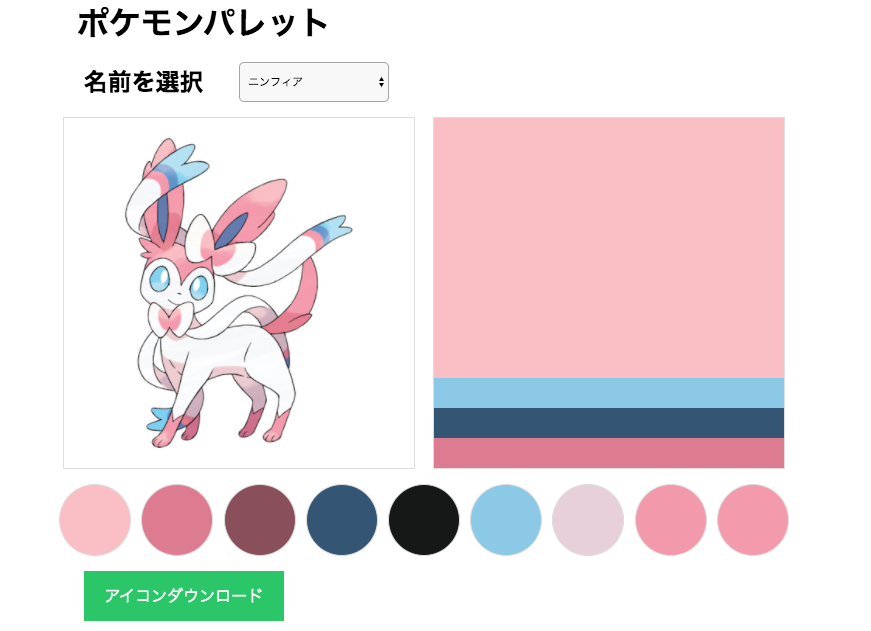
The process works like this:
- Colors extracted via JS libraries are stored in
iconColors - Vue dynamically binds these colors to the icon background (
v-bind:style)
HTML
<div class="result2" id="html-content-holder">
<div id="iconimg" class="maincolor" v-show="img" v-bind:style="{backgroundColor: iconColors.color0}" v-on:click="changeColor">
</div>
<div class="subcolor">
<div class="color1" v-show="img" v-bind:style="{backgroundColor: iconColors.color1}" v-on:click="changeColor1"></div>
<div class="color2" v-show="img" v-bind:style="{backgroundColor: iconColors.color2}" v-on:click="changeColor2"></div>
<div class="color3" v-show="img" v-bind:style="{backgroundColor: iconColors.color3}" v-on:click="changeColor3"></div>
</div>
</div>
javascript
var input = new Vue({
el: '#input',
data: {
img: '',
iconColors: {
color0: '',
color1: '',
color2: '',
color3: '',
},
paletteColors: []
}
});
Changing Colors by Clicking Icons
Since there are many colors available but only four displayed in the icon, I added the ability to switch colors by clicking.
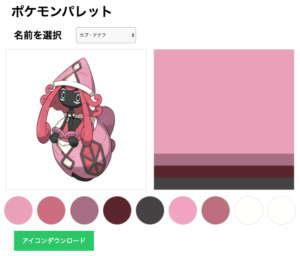
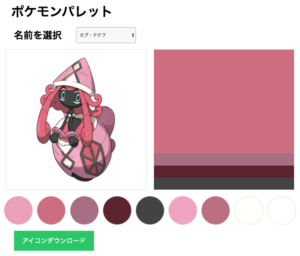
How it works:
- All extracted colors are stored in
paletteColors - Clicking an icon triggers a Vue method (
v-on:click="changeColor") - The method cycles through available colors and updates the icon display
HTML
<div id="iconimg" class="maincolor" v-show="img" v-bind:style="{backgroundColor: iconColors.color0}" v-on:click="changeColor">
javascript 1
var input = new Vue({
el: '#input',
data: {
img: '',
iconColors: {
color0: '',
color1: '',
color2: '',
color3: '',
},
paletteColors: []
}
});
javascript 2
changeColor: function() {
var vm = this;
var colors = vm.paletteColors;
var nowcolor = vm.iconColors.color0;
for (let i = 0; i < colors.length; i++) {
if (colors[i] == nowcolor) {
if (i == colors.length-1) {
vm.iconColors.color0 = colors[0];
} else {
vm.iconColors.color0 = colors[i+1];
}
}
}
}
Downloading Icons
Finally, I wanted users to be able to download the icons they created.
How it works:
- Clicking the download button triggers jQuery event handling
- The app renders the icon area into a canvas using
html2canvas - The canvas is converted into a downloadable PNG file
HTML
<div class="downloadBtn">
<a href="#" id="btn-Preview-Image" class="circle_spread_btn">アイコンダウンロード</a>
<a href="#" id="btn-Convert-Html2Image"></a>
<div id="previewImage"></div>
</div>
javascript
// 指定したidを画像にしてダウンロード
$(document).ready(function(){
var element = $("#html-content-holder"); // global variable
var getCanvas; // global variable
$("#btn-Preview-Image").on('click', function () {
html2canvas(element, {
onrendered: function (canvas) {
$("#previewImage").append(canvas);
getCanvas = canvas;
$("#btn-Convert-Html2Image")[0].click();
}
});
});
$("#btn-Convert-Html2Image").on('click', function () {
var imgageData = getCanvas.toDataURL("image/png");
// Now browser starts downloading it instead of just showing it
var newData = imgageData.replace(/^data:image\/png/, "data:application/octet-stream");
$("#btn-Convert-Html2Image").attr("download", "icon.png").attr("href", newData);
});
});
Conclusion
This project required lots of trial and error:
- Extracting colors that didn’t always match expectations
- Displaying palettes and icons
- Implementing click/tap-based color switching
- Adding download functionality
Although there are still challenges like slow loading and incomplete color extraction, the process was rewarding because it’s based on something I love.
I’d be happy if many people could see and use this web app.

